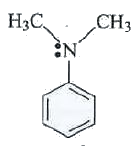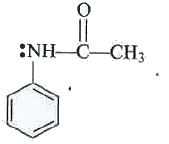Which of the following compounds will not undergo azo coupling reaction with benzene diazonium chloride?
Aniline
Phenol
Anisole
Nitrobenzene
The correct Answer is:D
To determine which of the given compounds will not undergo azo coupling reaction with benzene diazonium chloride, we need to analyze each compound's ability to act as a nucleophile. Azo coupling requires the presence of an electron-rich aromatic compound that can react with the weak electrophile, benzene diazonium chloride.
1. Identify the Compounds: The compounds given are:
- Aniline (C6H5NH2)
- Phenol (C6H5OH)
- Anisole (C6H5OCH3)
- Nitrobenzene (C6H5NO2)
2. Understand Benzene Diazonium Chloride: Benzene diazonium chloride (C6H5N2Cl) is a weak electrophile. It can react with nucleophiles, which are electron-rich species.
3. Analyze Aniline:
- Aniline has an amino group (-NH2) which is an electron-donating group.
- The presence of the -NH2 group increases the electron density on the benzene ring, making it electron-rich.
- Therefore, aniline can undergo azo coupling with benzene diazonium chloride.
4. Analyze Phenol:
- Phenol has a hydroxyl group (-OH) which also acts as an electron-donating group.
- The -OH group increases the electron density on the benzene ring, making it electron-rich.
- Thus, phenol can also undergo azo coupling with benzene diazonium chloride.
5. Analyze Anisole:
- Anisole contains a methoxy group (-OCH3) which is another electron-donating group.
- The -OCH3 group increases the electron density on the benzene ring, making it electron-rich.
- Therefore, anisole can undergo azo coupling with benzene diazonium chloride.
6. Analyze Nitrobenzene:
- Nitrobenzene contains a nitro group (-NO2) which is an electron-withdrawing group.
- The -NO2 group decreases the electron density on the benzene ring, making it electron-deficient.
- As a result, nitrobenzene cannot undergo azo coupling with benzene diazonium chloride because it does not have sufficient electron density to react with the weak electrophile.
7. Conclusion: Among the given compounds, nitrobenzene will not undergo azo coupling reaction with benzene diazonium chloride due to its electron-withdrawing nature.
Final Answer:
Nitrobenzene will not undergo azo coupling reaction with benzene diazonium chloride.
---
- Aniline (C6H5NH2)
- Phenol (C6H5OH)
- Anisole (C6H5OCH3)
- Nitrobenzene (C6H5NO2)
- Aniline has an amino group (-NH2) which is an electron-donating group.
- The presence of the -NH2 group increases the electron density on the benzene ring, making it electron-rich.
- Therefore, aniline can undergo azo coupling with benzene diazonium chloride.
- Phenol has a hydroxyl group (-OH) which also acts as an electron-donating group.
- The -OH group increases the electron density on the benzene ring, making it electron-rich.
- Thus, phenol can also undergo azo coupling with benzene diazonium chloride.
- Anisole contains a methoxy group (-OCH3) which is another electron-donating group.
- The -OCH3 group increases the electron density on the benzene ring, making it electron-rich.
- Therefore, anisole can undergo azo coupling with benzene diazonium chloride.
- Nitrobenzene contains a nitro group (-NO2) which is an electron-withdrawing group.
- The -NO2 group decreases the electron density on the benzene ring, making it electron-deficient.
- As a result, nitrobenzene cannot undergo azo coupling with benzene diazonium chloride because it does not have sufficient electron density to react with the weak electrophile.
Nitrobenzene will not undergo azo coupling reaction with benzene diazonium chloride.
Topper's Solved these Questions
- AMINESBOOK - NCERT EXEMPLAR ENGLISHCHAPTER - AMINESEXERCISE - SATQ
37 Videos
- AMINESBOOK - NCERT EXEMPLAR ENGLISHCHAPTER - AMINESEXERCISE - LONG ANSWER
3 Videos
- ALDEHYDE, KETONES AND CARBOXYLIC ACIDSBOOK - NCERT EXEMPLAR ENGLISHCHAPTER - ALDEHYDE, KETONES AND CARBOXYLIC ACIDSEXERCISE - Long Answer Type Questions
4 Videos
- BIOMOLECULES BOOK - NCERT EXEMPLAR ENGLISHCHAPTER - BIOMOLECULES EXERCISE - Long Answer Type Questions
5 Videos
Similar Questions
Knowledge Check
Which of the following compounds can give coupling reaction with benzene diazonium salt ?
A B
B C
C D
D
Which of the following compounds will undergo Cannizzaro reaction ?
ACH3CHOBCH3COCH3CC6H5CHODC6H5CH2CHOWhich of the following will not undergo HVZ reaction ?
APropanoic acidBEthanoic acidC2 - Methylpropanoic acidD2, 2 - Demethylpropanoic acid
Which of the following compounds gives azo dye test ?
View SolutionWhich of the following compounds will not undergo Friedel− Crafts reaction easily ?
View SolutionWhich of the following compounds will not undergo Friedel− Crafts reaction easily ?
View SolutionWhich of the following will undergo addition reactions ?
View SolutionWhich set of the following compound(s) give benzene on reaction with PhMgBr?
View Solution
